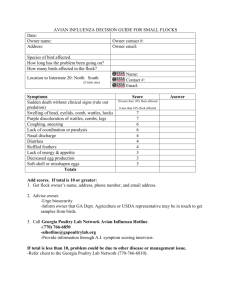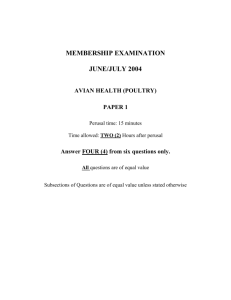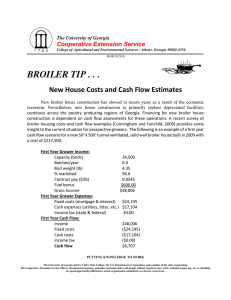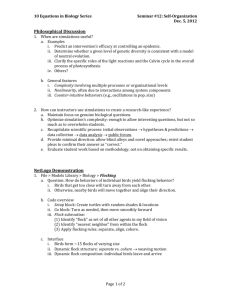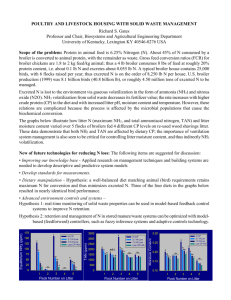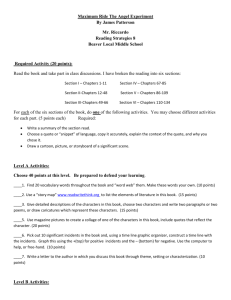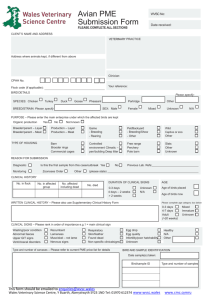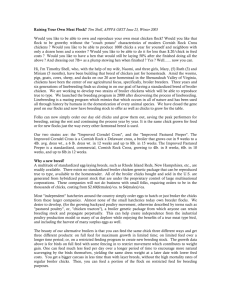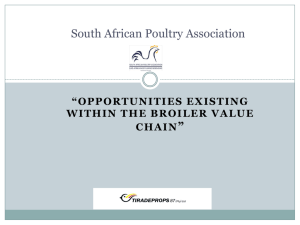NON-H5-H7-State-Resp..
advertisement
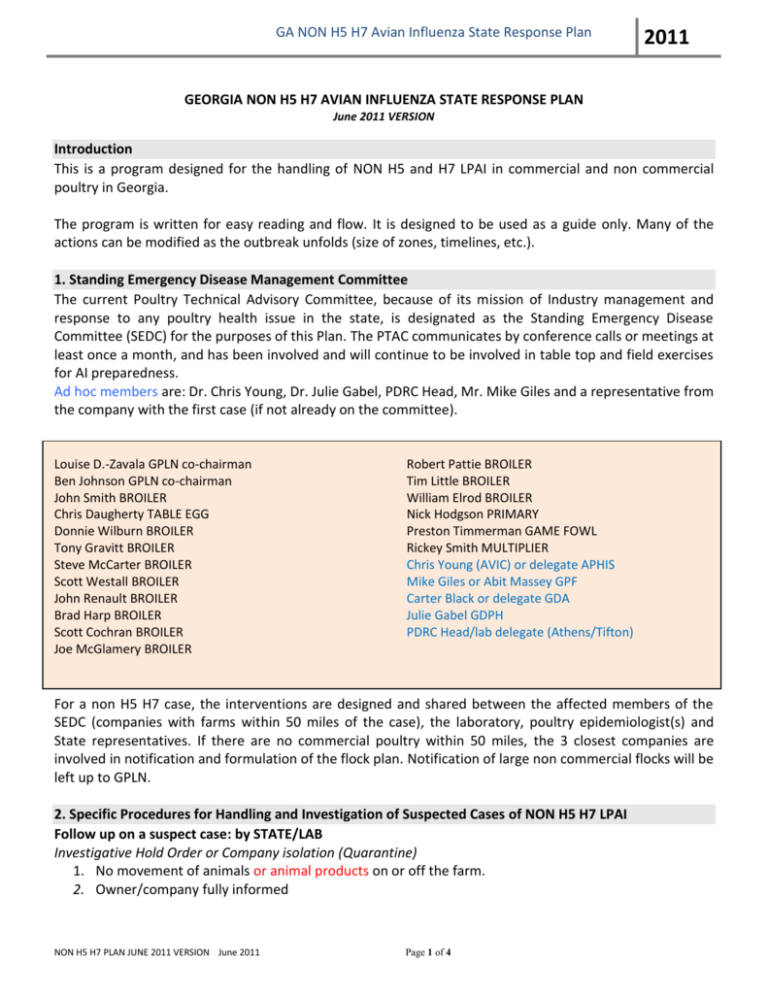
GA NON H5 H7 Avian Influenza State Response Plan 2011 GEORGIA NON H5 H7 AVIAN INFLUENZA STATE RESPONSE PLAN June 2011 VERSION Introduction This is a program designed for the handling of NON H5 and H7 LPAI in commercial and non commercial poultry in Georgia. The program is written for easy reading and flow. It is designed to be used as a guide only. Many of the actions can be modified as the outbreak unfolds (size of zones, timelines, etc.). 1. Standing Emergency Disease Management Committee The current Poultry Technical Advisory Committee, because of its mission of Industry management and response to any poultry health issue in the state, is designated as the Standing Emergency Disease Committee (SEDC) for the purposes of this Plan. The PTAC communicates by conference calls or meetings at least once a month, and has been involved and will continue to be involved in table top and field exercises for AI preparedness. Ad hoc members are: Dr. Chris Young, Dr. Julie Gabel, PDRC Head, Mr. Mike Giles and a representative from the company with the first case (if not already on the committee). Louise D.-Zavala GPLN co-chairman Ben Johnson GPLN co-chairman John Smith BROILER Chris Daugherty TABLE EGG Donnie Wilburn BROILER Tony Gravitt BROILER Steve McCarter BROILER Scott Westall BROILER John Renault BROILER Brad Harp BROILER Scott Cochran BROILER Joe McGlamery BROILER Robert Pattie BROILER Tim Little BROILER William Elrod BROILER Nick Hodgson PRIMARY Preston Timmerman GAME FOWL Rickey Smith MULTIPLIER Chris Young (AVIC) or delegate APHIS Mike Giles or Abit Massey GPF Carter Black or delegate GDA Julie Gabel GDPH PDRC Head/lab delegate (Athens/Tifton) For a non H5 H7 case, the interventions are designed and shared between the affected members of the SEDC (companies with farms within 50 miles of the case), the laboratory, poultry epidemiologist(s) and State representatives. If there are no commercial poultry within 50 miles, the 3 closest companies are involved in notification and formulation of the flock plan. Notification of large non commercial flocks will be left up to GPLN. 2. Specific Procedures for Handling and Investigation of Suspected Cases of NON H5 H7 LPAI Follow up on a suspect case: by STATE/LAB Investigative Hold Order or Company isolation (Quarantine) 1. No movement of animals or animal products on or off the farm. 2. Owner/company fully informed NON H5 H7 PLAN JUNE 2011 VERSION June 2011 Page 1 of 4 GA NON H5 H7 Avian Influenza State Response Plan 2011 Retest Procedures by GPLN 1. Test 30 birds per house or pen on the premise (30 blood samples and/or and 30 OP or cloacal swabs (depending on the species); Submit to Oakwood, Athens or Tifton Laboratory; 2. Preliminary epidemiological investigation with the grower is started at this time Negative Result: Releasing Hold order by STATE 1. If the result is negative, the owner/company is immediately notified. 2. All normal business resumes for the owner/company. 3. Positive Non H5/H7 case: Zone plan and Flock Plan considerations MANAGING AN OUTBREAK Presumptive Positive or Positive Case: 1. Lab personnel contact State veterinarian, poultry epidemiologist, and AVIC with result 2. Companies with farms within 50 miles are sent a map, and updates of lab results as they are available. Follow up on an Index Case: Farm: Implement individual flock plan if not already done. Zone 6: Implement Zone Plan Zone 6 Plan Recommendations 1. 2. 3. 4. 5. 6. 7. Stop all house clean out and litter spreading Stop all servicing No restocking of empty farms within Zone 6 Essential servicing (feeding birds) done at the end of the day, followed by truck sanitation. Companies step up Biosecurity levels within their operations. Companies step up AI surveillance of farms within 6 miles of case. Broiler flocks within the 6 mi zone can be marketed with a negative virus test within 48 hours of processing Flock Plan FACTORS TO CONSIDER: 1. Purpose of the flock (release, bird/dog trials, hobby, breeding, broiler, breeder, layer) 2. Epidemiological factors (density, proximity of source of infection, layout of the premise, premise biosecurity, contact with wild waterfowl, etc) 3. Age of the flock, season of the year, business cycle, testing cycles 4. Risk to other poultry (business, exports, sales) 5. Business continuity NON H5 H7 PLAN JUNE 2011 VERSION June 2011 Page 2 of 4 GA NON H5 H7 Avian Influenza State Response Plan 2011 POSSIBLE INTERVENTIONS: 1. Euthanasia (no indemnity, owner cooperation, adverse consequences state wide or locally, justification) 2. Hold premise until virus negative and release after 2 negative virus tests, one week apart: 3. Controlled marketing (processing a virus negative flock) 4. Vaccination GENERAL PRINCIPLES: 1. No movement of virus positive (PCR + on cloacal or OP swabs) birds 2. With most AI viruses, in ducks and chickens, shed peaks 2-3 days after infection, and virus cannot be found after 7 days. 3. Reporting Test results and activities Immediate communications with the State Veterinarian and the AVIC start as soon as a sample is sent to NVSL and come directly from the testing Laboratory. They are both ad hoc PTAC members for the purposes of this Plan. The AVIC is informed, but as long as the state handles this situation, he is not intimately involved. He is an advisor. Overall Flow of activities Suspicious Result; retest same sample; IF POS: Company Isolation of the Farm Retest Farm: Blood and OP/TR swabs sswabswas swabs All tests negative: Release of Company Isolation One or more positive test: Activate GIS and map Send samples to NVSL One or more positive test by NVSL: Report to State Vet and AVIC Activate PTAC AFFECTED FLOCK Appraisal Epidemiology Flock Disposition Quarantine Release Restocking of Farm ZONE MANAGEMENT Establish biosecurity station at the 6mi zone if necessary Surveillance Priorities Traffic Restrictions Restocking of Zone 5. Quarantine Measures for Presumptive and Confirmed Index Cases Quarantine A quarantine is placed on the farm by GDA as soon as the case is strongly suspect or confirmed by NVSL. The quarantine restricts movement of animals and animal products off the farm. It is enforced by GDA personnel. NON H5 H7 PLAN JUNE 2011 VERSION June 2011 Page 3 of 4 GA NON H5 H7 Avian Influenza State Response Plan 2011 Quarantine Release Farms will be considered for release, depending on the flock plan: After C&D and negative environment test After last negative test. 5. Monitoring Activities in Control Zones Recommended sampling protocol Monitoring Activity Blood OP/T swabs live birds Barrel 30/house 30/house n/a n/a √ (make up) √ (if insufficient number of dead birds, make up sample with OP/T swabs Zone adult birds √ √ (make up) √ (if insufficient number of dead birds, make up sample with OP/T swabs) Out-of-the-6-mile-Zone Adult birds for mvt and Processing age Broilers √ √ n/a 30/flock 30/premise (Make up) Do this first: 30/premise or available mortality. (if insufficient number of dead birds, make up sample with OP/T swabs Confirmation of case Zone broilers over 21 days Non Commercial birds 6. Approval and Use of Vaccines GA would consider vaccination in some extreme circumstances. GA will consider using vaccine as a means towards eradication, and NOT as an only control method. The process of approval will include concurrence of the State Veterinarian for NON H5 and H7 vaccines as part of the flock plan. Vaccine would be purchased and administered by the company and be under the control and permitted for use by the State of GA. The Federal and State role in the vaccination process will be limited to oversight and monitoring. 7. Information The companies within 50 miles of the case will be notified immediately and sent results updates and maps. They also participate in the formulation of the flock plan. All other members of the PTAC are made aware of the resolution of the situation when appropriate. 8. Indemnity There is no indemnity for non H5 H7 AI NON H5 H7 PLAN JUNE 2011 VERSION June 2011 Page 4 of 4
